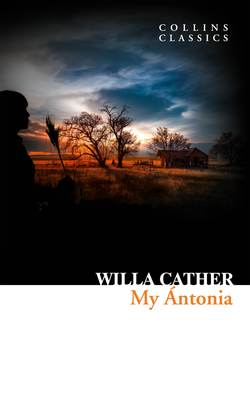Читать книгу Collins Classics - Willa Cather - Страница 22
XIII
ОглавлениеThe week following Christmas brought in a thaw, and by New Year’s Day all the world about us was a broth of grey slush, and the guttered slope between the windmill and the barn was running black water. The soft black earth stood out in patches along the roadsides. I resumed all my chores, carried in the cobs and wood and water, and spent the afternoons at the barn, watching Jake shell corn with a hand-sheller.
One morning, during this interval of fine weather, Ántonia and her mother rode over on one of their shaggy old horses to pay us a visit. It was the first time Mrs. Shimerda had been to our house, and she ran about examining our carpets and curtains and furniture, all the while commenting upon them to her daughter in an envious, complaining tone. In the kitchen she caught up an iron pot that stood on the back of the stove and said: “You got many, Shimerdas no got.” I thought it weak-minded of grandmother to give the pot to her.
After dinner, when she was helping to wash the dishes, she said, tossing her head: “You got many things for cook. If I got all things like you, I make much better.”
She was a conceited, boastful old thing, and even misfortune could not humble her. I was so annoyed that I felt coldly even toward Ántonia and listened unsympathetically when she told me her father was not well.
“My papa sad for the old country. He not look good. He never make music any more. At home he play violin all the time; for weddings and for dance. Here never. When I beg him for play, he shake his head no. Some days he take his violin out of his box and make with his fingers on the strings, like this, but never he make the music. He don’t like this kawntree.”
“People who don’t like this country ought to stay at home,” I said severely. “We don’t make them come here.”
“He not want to come, never!” she burst out. “My mamenka make him come. All the time she say: ‘America big country; much money, much land for my boys, much husband for my girls.’ My papa, he cry for leave his old friends what make music with him. He love very much the man what play the long horn like this”—she indicated a slide trombone. “They go to school together and are friends from boys. But my mama, she want Ambrosch for be rich, with many cattle.”
“Your mama,” I said angrily, “wants other people’s things.”
‘Your grandfather is rich,’ she retorted fiercely. “Why he not help my papa? Ambrosch be rich, too, after while, and he pay back. He is very smart boy. For Ambrosch my mama come here.”
Ambrosch was considered the important person in the family. Mrs. Shimerda and Ántonia always deferred to him, though he was often surly with them and contemptuous toward his father. Ambrosch and his mother had everything their own way. Though Ántonia loved her father more than she did anyone else, she stood in awe of her elder brother.
After I watched Ántonia and her mother go over the hill on their miserable horse, carrying our iron pot with them, I turned to grandmother, who had taken up her darning, and said I hoped that snooping old woman wouldn’t come to see us any more.
Grandmother chuckled and drove her bright needle across a hole in Otto’s sock. “She’s not old, Jim, though I expect she seems old to you. No, I wouldn’t mourn if she never came again. But, you see, a body never knows what traits poverty might bring out in ’em. It makes a woman grasping to see her children want for things. Now read me a chapter in ‘The Prince of the House of David.’ Let’s forget the Bohemians.”
We had three weeks of this mild, open weather. The cattle in the corral ate corn almost as fast as the men could shell it for them, and we hoped they would be ready for an early market. One morning the two big bulls, Gladstone and Brigham Young, thought spring had come, and they began to tease and butt at each other across the barbed wire that separated them. Soon they got angry. They bellowed and pawed up the soft earth with their hoofs, rolling their eyes and tossing their heads. Each withdrew to a far corner of his own corral, and then they made for each other at a gallop. Thud, thud, we could hear the impact of their great heads, and their bellowing shook the pans on the kitchen shelves. Had they not been dehorned, they would have torn each other to pieces. Pretty soon the fat steers took it up and began butting and horning each other. Clearly, the affair had to be stopped. We all stood by and watched admiringly while Fuchs rode into the corral with a pitchfork and prodded the bulls again and again, finally driving them apart.
